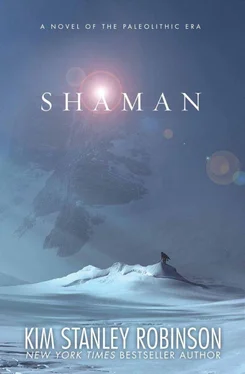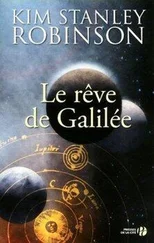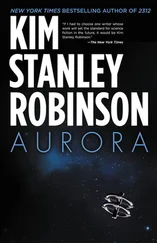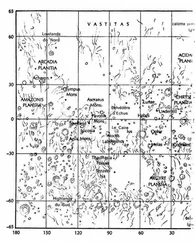Breathe in, breathe out, breathe in, whack.
Breathe in, breathe out, breathe in, whack.
The winter air was warming, strike by strike. His fur lifted a little on the river breeze, his sweaty skin cooled with the waft. The love of stone work, the bliss of it.
Two of the fast ones came by and stopped to visit with him. The old woman and her boy. They were not on the hunt and he regarded them without fear. The old woman had been good to him, and the boy was not on the hunt. They jabbered at him in their hoarse nasal voices, not like any of the other animals’ voices, various and expressive like certain birds. By now he had learned some of the old woman’s words, how are you, good, hurt, hungry, thank you, and he listened to her and tried to make out more, and told her he was good. He showed them his new stone blade and they were suitably impressed. It was almost perfectly balanced, and had as many facets as the grain of the stone could take.
The old woman hefted it and asked him a question. It seemed she was asking him what he did with the blade, or what it was for. And yet there she was hefting it. Shyly he took it back from her and held it in his fingers, turned it over, felt the edge, eyed it edge on to see the balance. He handed it back to her. That was what it was for.
—It’s just to look at, he whistled at her.—I made it just to look at. Our women like to see such things.
She shook her head, not understanding him.
—Good, he said in her tongue. She nodded, glancing at him uncertainly.
Spear tips were also good to make, but he liked these show blades most. It was true you could throw one into a herd, and if it hit an animal and caused them to stampede, smaller members of the herd might get hurt and be easy to track and kill. Boys did that before they learned to spear. But you didn’t need the facets and the balance for that. Any rock with an edge would do.
He knew the fast ones did things similar to this blade. Their clothes were painted and fringed with loops of leather, and they wore leather strings around their necks from which they hung teeth and shells. They painted their skin with bloodstone and char. They painted cliff walls. All that, and yet they did not see what he was doing with the blade. It was too bad they didn’t whistle.
All the things they did. So active around their camp, always bustling around doing things. Going out on the hunt. All kinds of different sizes of group, different directions, different kinds of hunts. They were always in a hurry. Hurry slowly, his mother had always whistled. It was an old tune mothers whistled to children. He had heard his grandmother whistle it to his mother once.
Now the old woman wanted him to accompany them down to the riverbank. He got up and followed them, taking the new blade with him.
They wanted his help in moving a boulder from the bank into the shallows. He couldn’t understand why they wanted it, but after the boy showed him the motion several times, he couldn’t see any other explanation. He got behind the boulder with the boy and together they rolled it into the stream, where it knocked up a mighty splash.
—Thank you! they said to him, and made motions as if eating from the river. Ah: the boulder might be the start of a fish trap. They were changing the river to make it easier to catch the fish. Some kind of trap.
—Thank you! he said, and whistled,—Good idea! He ate fish when he could catch them. Mostly it was the red ones who swam upstream to die. Before they died they were still good to eat. After they died they fell apart very quickly.
One day he would go back west to his people, who were at the red fish river west of the ice caps. He would bring them the best blades ever knapped, and show them things to do that he had learned from the fast people. Then his wife might take him back again. Then his father might forgive him. If they were still alive.
It turned out Elga and Loon’s child had been born in a bad spring. The freeze-no-more moth never showed up, and not long after the child was born they ran out of their winter stores, all the nuts and skin bags of fat, the frozen ducks and smoked fish, the edible roots and dried caribou meat, everything in the final weeks measured out in pinches or one by one. Schist again took on this task, and Hawk and Moss did not presume to interfere or criticize. The shortage was damaging enough to Schist, they did not have to refer to it or add to it, and indeed they could not have done any better themselves: a bad spring was a bad spring.
It meant the men needed to be out hunting more than ever, hoping their snares and traps would catch someone to eat. But this winter the land was bare. In some winters there were enough snow hares to feed an entire pack, all the snow-white little people getting fatter as the rising snowpack lifted them to higher and higher forage on the willow bushes. Snow hares actually got fat in winter, and they were easy to trap. Wait, I see something: two eyes in a bush, caught in a trap.
But this year there were no snow hares to be found. Some years were that way, Heather said. They would be better off looking for ptarmigan and grouse. Wait, I see something: black sticks moving. Walk around in the early morning with a net in hand, ready to cast it as the white birds burst out of their snow beds. You had to be fast, but if you were ready there was just enough time. But this year, no ptarmigan or grouse.
Loon went out with his friends on the hunt, and he went out on his own or with others to check traps, ranging as far as he could. After the stag he found with Moss, no one else seemed to be around. Sometimes he found broken traps, and once a vixen, once a muskrat. Without the snow hares all the little hunter people were just as hungry as the big hunters, and easier to catch. Anything at all was worth bringing back to camp; once he found a dead mouse and brought it back, and no one laughed. But there were two score and four people in the pack, and finding enough food for all of them every day was becoming the only thing anyone thought about. It was the only thing one felt, a sucking of the stomach up and in, until it pressed hard against the backbone, and deep into one’s thoughts.
But it stayed cold. The hunters began to lack the strength to range as far as before, they had to conserve their efforts and save them for what really mattered. The other men considered Loon lucky because Elga could breastfeed him from time to time, to give him a little help keeping going. And it was true that it was a huge comfort to suck her thin sweet warm milk from her, while their baby sucked from the other breast. Once the babe reached out with his eyes closed and patted Loon on the head, as if to bless his participation.—I guess that’s why I have two, Elga said with a little smile.
But Badleg impeded him, and he was no more successful than any of the rest of the hunters. Once he came on a muskrat dead in one of their tree traps, but it looked empty somehow, and it was: the muskrat’s head had been touching the ground, and ground shrews had eaten up through the face and devoured all of its meat and intestines, leaving it a fur bag filled with nothing but bones. Loon brought this remnant back to camp anyway; they would eat the marrow out of the bones, and use the fur.
Another time he went out on a trap circle and came on a wolverine biting through the sinews of a snare in order to release a marten who had been caught. As Loon ran toward the scene, the wolverine cut its little cousin free and they both scampered off on the snow, the marten like an elongated squirrel, the wolverine in its big hops, all four feet landing together under him. Quickly they both disappeared among the trees. Loon had heard of this happening, but had never seen it himself. Wolverines and martens were family. Bear and beaver were similarly family. The bigger ones always left their little cousins alone.
Читать дальше











